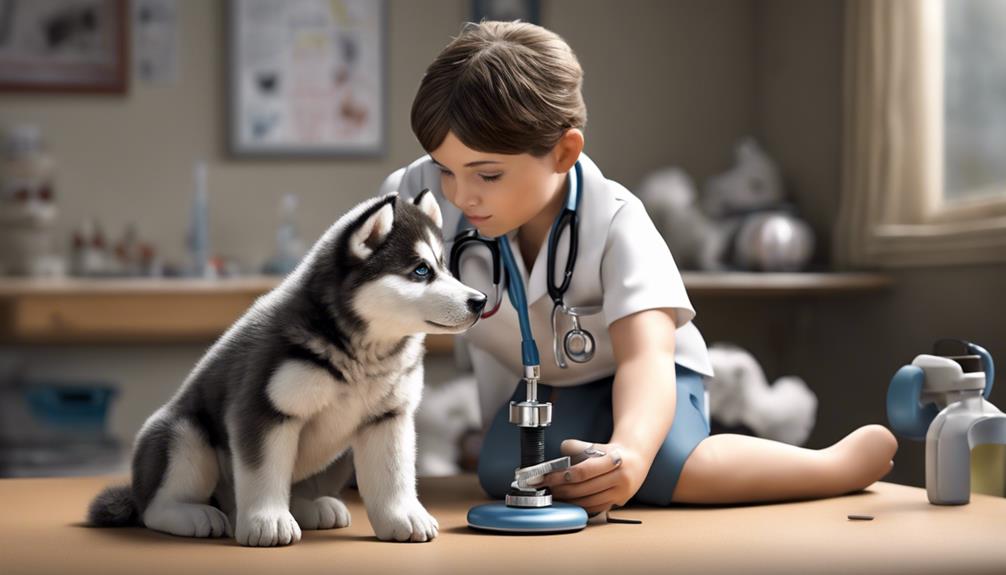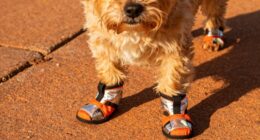If you’re looking to improve the growth of your small husky, consider genetics, diet, physical activity, and health factors. Ancestral background and mixed heritage can affect size, while hormonal imbalances or parasites could hinder growth. Ensure a balanced diet, possibly high in protein or raw, and consult a veterinarian for individualized nutrition advice.
Tailor exercise for muscle development, mental stimulation, and veterinarian check-ups are vital. Supporting healthy growth involves a comprehensive approach.
Key Takeaways
- Ensure a balanced diet with proper nutrients.
- Tailor exercise for muscle development.
- Regular vet check-ups for growth monitoring.
- Address potential health issues promptly.
- Consult vet for personalized growth plan.
Possible Reasons for Small Husky Growth
When considering possible reasons for small Husky growth, genetics emerge as a significant factor to take into account. Huskies inherit traits from their lineage, and mixed ancestry can play a role in determining their size potential.
Sometimes, underlying health conditions like hormonal imbalances or parasitic infections can impede a Husky's growth, leading to smaller stature. Proper diet and nutrition are essential for a Husky's development, directly impacting their size. Without essential nutrients, a Husky may struggle to reach their full growth potential.
Additionally, regular exercise is crucial for muscle growth and overall physical well-being in Huskies. By ensuring your Husky receives adequate nutrition, exercise, and addressing any potential health issues promptly, you can support healthy growth and development.
Evaluating Husky's Diet and Nutrition

To guarantee your small Husky reaches its full growth potential, evaluating your Husky's diet and nutrition is essential. It's important to make sure your Husky is receiving a balanced diet that provides the necessary nutrients for ideal growth and development. Consulting a vet can help determine if your Husky's current diet is meeting its nutritional needs. Consider options like high-protein, grain-free kibble, or a raw diet with proper ratios of protein, bone, and offal to support healthy growth. Monitoring your Husky's weight and body condition is vital to ensure it is getting the right nutrition. Adjust the diet as recommended by your vet to support your Husky's growth if it is underweight or smaller than expected.
| Aspect | Recommendations |
|---|---|
| Diet Type | High-protein, grain-free kibble or raw diet with proper ratios of nutrients for growth |
| Vet Consultation | Discussing your Husky's diet with a vet to ensure it meets nutritional needs |
| Body Condition | Monitoring weight and body condition regularly to adjust the diet for healthy growth |
Implementing Proper Exercise Regimen
Wondering how to best support your small Husky's healthy growth?
Engaging your small Husky in appropriate exercise routines is vital for their development. Tailor activities like short walks, play sessions, and light jogging to promote muscle development without overexerting them. Avoid intense or prolonged exercises that could strain their growing muscles.
Additionally, provide mental stimulation through interactive games and training exercises to keep your small Husky active and engaged. Consulting with a veterinarian or professional dog trainer can help you create a customized exercise plan that suits your small Husky's size and specific needs.
Addressing Potential Health Concerns

To reveal the prime growth and well-being of your small Husky, it is essential to address any potential health concerns promptly through regular veterinary check-ups. Owners of Siberian Huskies should be vigilant about parasitic infections and hormonal imbalances, as these can greatly impact your dog's development. Genetic testing can expose underlying health issues that might be affecting your Husky's size and overall health. Consult with a vet to make sure your Husky is receiving the right nutrients for ideal growth. Early intervention and treatment of health concerns are crucial to supporting your Husky's well-being and potential growth.
| Health Concerns | Actions |
|---|---|
| Parasitic Infections | Regular deworming and flea prevention |
| Hormonal Imbalances | Consultation with a vet for treatment |
| Genetic Testing | Identify underlying health conditions |
| Nutrients | Ensure a balanced diet for growth |
| Optimal Growth | Monitor growth milestones |
Strategies to Support Husky's Growth
Implementing tailored dietary plans and engaging in appropriate exercises are essential strategies to foster the growth and development of your small Husky. When caring for a Siberian husky, ensuring they receive a balanced diet specifically designed for their size and growth requirements is important.
Regular vet consultations play an important role in monitoring your Husky's growth and adjusting their diet and exercise routine accordingly. Engaging your small Husky in age-appropriate exercises not only promotes muscle development but also enhances their overall physical well-being.
Consider genetic testing to gain insights into your Husky's ancestry and potential size indicators for more personalized care. Additionally, promptly addressing any underlying health conditions can have a significant impact on your small Husky's growth and development positively.
Frequently Asked Questions
Why Is My Husky so Tiny?
We empathize with your concern about your Husky being tiny. Various factors, such as genetics, mixed ancestry, and potential health conditions, can contribute to a Husky's smaller size.
DNA testing and a vet consultation can provide valuable insights into why your Husky is small. Addressing any underlying health issues or hormonal imbalances is crucial to support your Husky's growth.
We're here to assist you in navigating this journey with your beloved pet.
How Can I Make My Husky Gain Weight?
We've found that a balanced diet rich in protein and healthy fats, like fish oil or coconut oil, can help our Husky gain weight effectively.
By offering smaller, frequent meals and monitoring progress closely, we've seen steady growth.
Consulting with a vet to rule out any health issues is essential.
Our Husky's well-being is our top priority, so we adjust their diet and exercise routine as needed for healthy development.
Can a Husky Stay Small?
Yes, huskies can stay small due to various factors like genetics or lineage. It's vital to provide tailored nutrition and regular exercise for small huskies' growth and health.
Keeping up with vet check-ups is critical. Investigating breeders, adjusting diet, and addressing health concerns promptly are significant for proper care.
It's all about understanding and meeting the unique needs of a small husky to guarantee their well-being and development.
What Type of Husky Is Small?
Some smaller types of Huskies include the Miniature Siberian Husky and Alaskan Klee Kai. These breeds are selectively bred for their reduced size.
Miniature Siberian Huskies typically weigh around 18-30 pounds, while Alaskan Klee Kais are even smaller, weighing between 10-20 pounds.
Despite their size, these smaller Huskies can still exhibit the characteristic traits and energy of their larger counterparts.
Can Small Size in Huskies be a Result of Breeding?
Yes, small size in Huskies can be a result of breeding practices employed by top cat breeders Georgia. Through selective breeding, breeders can manipulate the genetics of the Husky to produce smaller specimens. However, it’s essential for breeders to prioritize the health and well-being of the animals.
Conclusion
To sum up, by making adjustments to our husky's diet, exercise routine, and addressing any potential health issues, we can support their growth and overall well-being.
Let's continue to provide the love and care needed for our furry friend to thrive and reach their full potential.
Together, we can help our husky blossom into a strong and healthy companion.









